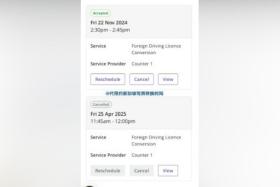More than 50 changes spanning criminal justice system approved
It is among more than 50 changes spanning the criminal justice system
The video recording of statements from suspects will be introduced in phases, starting with the interviews of those accused of specified rape offences, Senior Minister of State for Law Indranee Rajah said yesterday.
The video recording of such interviews is mandatory, she added, disclosing that enough police officers have been trained to implement the first phase.
This new requirement is among more than 50 changes spanning the criminal justice system debated and approved by Parliament yesterday.
Ms Indranee said video recording the interviews will allow the courts to take into account their demeanour and provide an objective account to help decide on allegations that may be raised about how the interview was conducted.
The legislation will allow for flexibility to take into account operational exigencies, she added. For example, there may be a need to record a handwritten statement immediately where a suspect is arrested.
The Government plans to eventually let video statements of vulnerable victims be used in place of oral testimonies in court.
During the debate, MPs expressed support for the video recording of suspects' statements, saying it makes the interview process more transparent.
Mr Louis Ng (Nee Soon GRC) added that video recording protects both interrogator and the person being interrogated.
Some aspects of the regime worry Mr Ng.
He said video recording will reduce instances of false confessions only if it captures the entire interaction between the investigator and suspect.
He asked if there are guidelines to ensure the entire interview is recorded. The footage should focus equally on the suspect and police officer and show the whole room, he said.
Nominated MP Kok Heng Leun said if threats, inducements and promises were offered before the recording, this would defeat its purpose.
Ms Indranee said it would not be feasible to record every exchange between a police officer and the accused from time of arrest to statement-taking.
She said the rooms for video-recorded interviews are purpose-built to ensure good quality of sound as well as picture.
One camera focuses on the interviewee. Another captures an overview of the entire room.
Nominated MP Mahdev Mohan asked why defence counsel are not allowed to have copies of the recordings.
Ms Indranee said this was to safeguard against recordings being leaked, lost or misplaced. Defence lawyers can view the recording at an approved place as many times as they want. They will be given a transcript.
The changes to the Criminal Procedure Code and Evidence Act also include protection measures for victims of sexual and child abuse; the introduction of deferred prosecution agreements in which corporations can be given amnesty from prosecution in exchange for complying with certain conditions; and an expansion of the eligibility criteria for community sentences.
Get The New Paper on your phone with the free TNP app. Download from the Apple App Store or Google Play Store now


